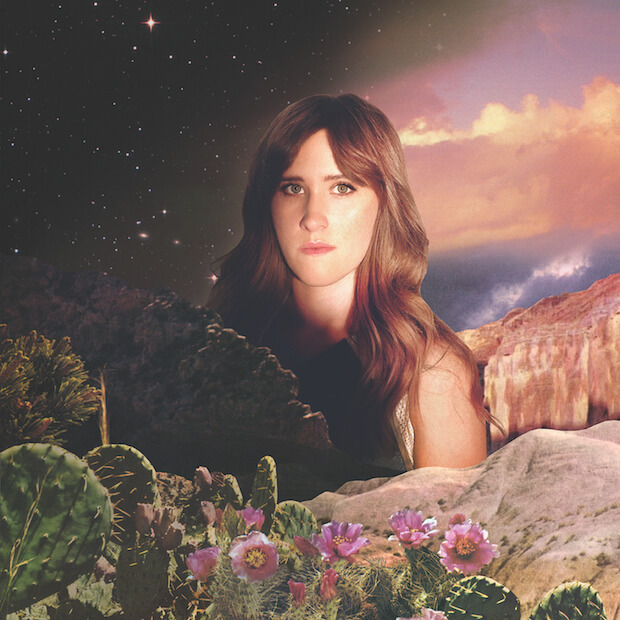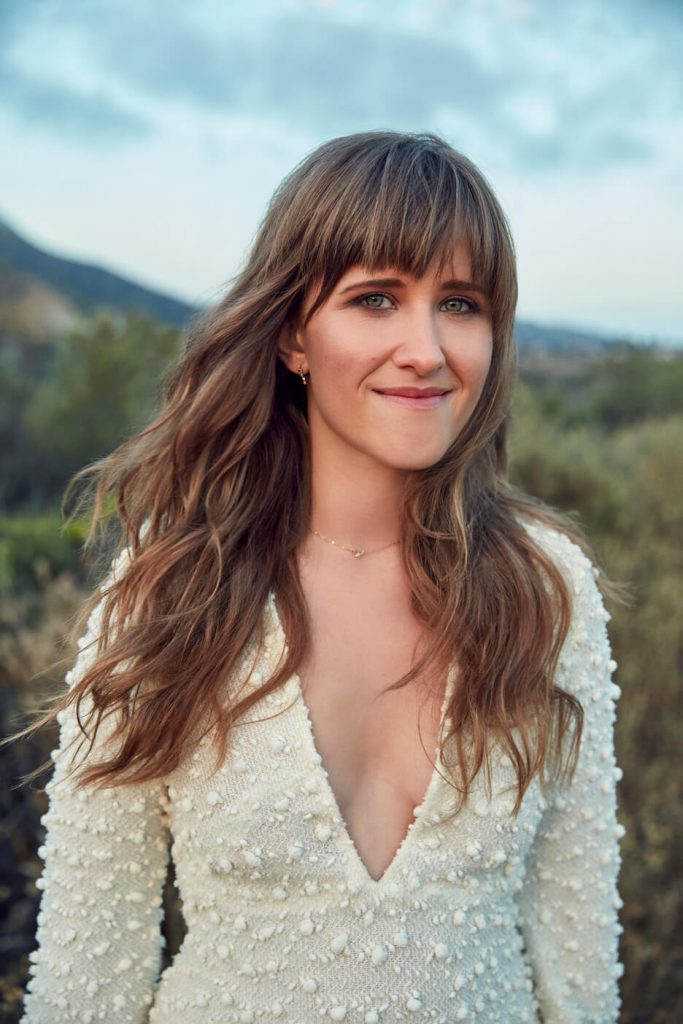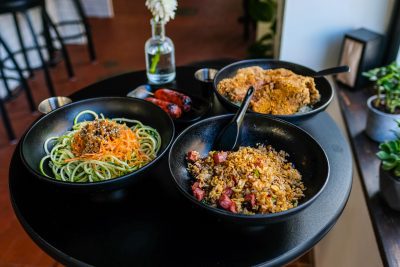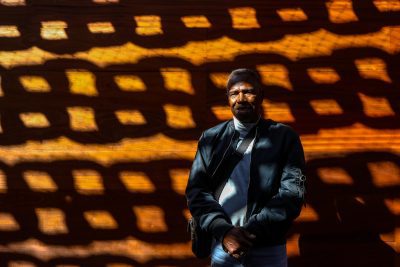Westward Bound: Amber Coffman On Going Solo, Moving To L.A, and Frank Ocean
After five years and a multitude of beautiful harmonies with Brooklyn staple Dirty Projectors, Amber Coffman headed west in 2013, turning over a new leaf in more ways than one. Once situated in Los Angeles, she began working on her debut solo album, which will finally be released into the world on June 2nd, via Columbia Records.
Coffman’s album, City of No Reply, is an 11-track quick listen that dabbles with different paces and styles throughout its running time. With singles “All to Myself” and “No Coffee,” she put out two different types of hybrid rock; the former leans on a modern synth-y sound, while the latter wraps her quick-paced croons around a guitar lick that brings Gary Clark Jr. to mind. A third single, titled “Nobody Knows,” dropped last week, and sounds a lot like what you’d imagine A Seat At The Table era Solange to sound like if she teamed up with Dirty Projectors—not stunning, considering the two have performed together in the past.
Coffman’s worked with a plethora of industry titans through the years—Frank Ocean, Diplo, and J. Cole among them—so her debut album is the logical next step. And, of course, the album is great. She famously sang lead vocals on “Stillness is the Move,” the most popular Dirty Projectors song. That’s always given indie fans—at the very minimum—a taste of what she can do. Now, with City of No Reply, they’ve got their chance at the full dish. We caught up with the unique vocalist last week, chatting about about her album, moving from Brooklyn to L.A., and making it onto Frank Ocean’s Blonde.

Brooklyn Magazine: Has anything been particularly fun—or tedious—in doing all this record stuff for the first time?
Amber Coffman: Hmm… [LAUGHS]. It’s all kind of a mixture. There’s quite a lot of tediousness, you know? Finalizing the album artwork [seen above], there’s a lot of decisions to be made that I’m making for the first time. I got a little teary-eyed when we finalized the album artwork, because I realized that I’m going to be holding it in my hands before too long. That was a crazy thing to think.
What were some of your influences for this album? What were you listening to when you were writing it, when you were recording it… and what have you been listening to lately?
It was such a long process, so I think I moved through a lot of different periods of listening to different things. I think leading up to it I was listening to a lot of Kendrick Lamar, obviously, and Deerhunter—love that band. Joanna Newsom… I guess her latest record came out after I was done, but I’m a huge fan of hers, so I listen to her a lot. I listened to What’s Going On quite a lot around the time that we started recording, the Marvin Gaye album. I go back and forth between listening to something old and listening to something new, but it’s pretty random for me, and I haven’t found my rhythm yet with finding new music.
Somehow, I just figured out that new music day is always Friday [LAUGHS]. I think I knew that, but I read something somewhere where someone was like, “Yeah, I always make it a point to check out what comes out on Fridays” and I was like, “Great idea! I should do that.”
It used to be Tuesdays a couple years ago.
Yeah, I remember that. I guess the internet changes everything.
Moving from New York to Los Angeles, what kind of impact did that have on you musically, and more broadly, what has L.A. been like compared to New York?
I think moving out here gave me a lot of mental space to be able to just think and come up with ideas. I really have to have privacy in order to write most of the time, so that’s been a huge thing. It’s hard to say musically how much it’s changed me, because I don’t know if it has, you know? But I’m sure it’s had some kind of impact, subconsciously, that I don’t even know how to describe.
It has a very open feeling. L.A. sort of feels like you can create whatever kind of reality or way of living that you want. It really just feels wide open. I miss New York, especially when I come back to visit; it’s always a blast. I lived there longer than any other place I’ve ever lived in my life, so I really do feel comfortable there—it feels like home in a lot of ways to me. I miss going out there, I think that’s a lot more fun, the nightlife and all of that. I also miss the way it forces you to get up and get going, and move around and go and interact with the world. I really felt that there. It’s much easier to stay still out here, which is good for writing, but it’s a very different thing.
L.A, I mean, it’s cliché, but the nature, that’s been huge. Just being able to go right up the road and climb a mountain is pretty amazing. That’s a special thing.
It’s way slower.
Yeah. It’s definitely slower. For me, I think that’s good for writing, because you kind of have permission to just be still, and listen to yourself.
What was different about making your first solo project as opposed to all of your previous work with Dirty Projectors?
Pretty much everything [LAUGHS]. Everything was different about it. All of the decisions were made by me, and it was different in pretty much every way I could imagine. I really just had a blank slate coming out here, and I was fortunate to have Columbia and the people on my team turn me loose, and let me come up with something. I had little seeds of ideas floating around already when I came here, but for the most part it was a pretty blank slate.
It was…I’m trying to think of how I can describe it to you—this is, like, my second interview, and I’m just like… all right. How do you talk about it? This has all been inside my head for so long, you know? Now to start talking about it.
Right. Yeah.
I got to try out a lot of things. I did sessions with different producers, and I got to do a lot of experimenting and discovering, which was really fun. It was very different.


Did being a part of Dirty Projectors previously make it easier to ease into making this first album on your own?

Yeah, I’m sure it did. That’s one thing I’ve been really grateful for, is that I had a decade of experience being on records, and touring, and working with different people. I think that was extremely helpful, but I guess also I got to realize what my own process is for the first time, in a way. My own way of working, which is definitely its own thing—it’s quite different from what I was used to. That’s just being allowed to take my time. I don’t know; I think also my process will evolve, and the way that I make records will change from record to record, most likely.
But for this first one, it wasn’t the kind of thing where I would sit down and write a song in a day. An idea would come, a seed would come, and then I would just sort of sit on it for a while, and it would keep coming back to me, and then something else would attach itself to the idea. I would put down the demo, just to have the idea down, and sometimes take a break from an idea once I felt like I had gone as far as I could, and come back to it in a couple months and finish it down the line. These songs, for the most part, came together piece-by-piece over a long period of time. So that was definitely a new thing.
I really like how the album is a mix between slower and faster songs. My favorite is probably “Dark Night,” which is super fun and fast, and then the singles were “All to Myself,” which is slower, and “No Coffee,” which is kind of right in the middle. Were you conscientious when putting the record together of switching up the pace?
That’s definitely something that I’ve wanted, but because each song would pop up on it’s own day over the course of a few years that I was working on it, I didn’t have a skeleton map of the album as a whole at all. I wanted it to be a mixture; I wanted it to be a something for everyone kind of record, and to reflect on the different shades of my own experiences and personality. I think I have two sides: one is upbeat and fun and wild and crazy, and the other is pretty introverted and reflective. It just wouldn’t feel like me to make a record that was all one sound; it wouldn’t feel like a good representation.
You said in an interview with Pitchfork, that you felt totally comfortable being honest and transparent recording the album, regardless of who else was in the room. Do you still feel that way as you move towards the album’s release?
Yeah, I think the album does feel pretty naked in that way, and I guess I’m proud of it. It’s also nerve wracking, because I don’t know what people are expecting. I can’t really worry about it, but you don’t know how it will be received, and how people will feel about these things.
I think that for me, if I had tried to write a bunch of super-elusive lyrics, and use a bunch of effects on my voice, and stuff like that, that would’ve been really a safe way to go. We’re so used to hearing that in music over the last decade or so—I really just wanted to make something that was super straightforward, and none of that elusiveness that can cover up people’s emotions sometimes.
You were on the Frank Ocean album Blonde [on opening track, “Nikes”] last year?
Yeah.
How did that happen? That was one of my favorites.
Oh man. I love that record, and was just beyond honored to be a part of it at all. I love him so much. Yeah, I obviously listened to Frank Ocean a lot leading up to making the record too. We were introduced through Wes—Diplo—initially, a few years ago. I guess he had my number, and would just hit me up from time to time when he came to town to work on his record, and he would just be here in L.A., and I would go in and put down a part. Went in a couple different times, so I’ve just absolutely loved his music so much. It was really fun to do that.
You got to be on the first track of that album that everyone was waiting so long to hear!
Yeah! I had no idea it was going to be the first track. It was a surprise to me, too. It was super exciting.
That’s special. You’ve gotten to work now, outside of your primary projects, with J. Cole, Diplo, and Frank. Who else would you want to collaborate with?
There are so many people that would be amazing to work with. I don’t even know where to start. That’s a tough one! I’d like to work with more women—female producers, female writers, and singers, and things like that. I’d like to see more women collaborating together. I guess it would be amazing to work with Missy Elliott or something [LAUGHS].
Amber Coffman’s debut solo album City of No Reply is out via Columbia Records on June 2. Check out the video for “No Coffee” below:
This interview has been condensed for content and clarity.
Photos courtesy of Jason Frank Rothenberg
You might also like 




















